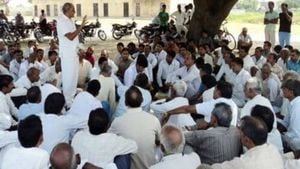India's political arena is set to experience significant turbulence as the controversial 'One Nation, One Election' Bill is expected to be introduced today by Union Law Minister Arjun Ram Meghwal during the Lok Sabha session. This bill aims to align the electoral schedules for the Lok Sabha and all state assemblies, proposing to hold elections simultaneously, which the ruling Bharatiya Janata Party (BJP) argues will streamline processes and save government resources.
The introduction of the Constitution (One Hundred and Twenty-Ninth Amendment) Bill, 2024, is the next step following the Union Cabinet's endorsement of the proposal, based on recommendations from a high-powered committee led by former President Ram Nath Kovind. The committee advocated for implementing simultaneous elections across various levels of governance, including local bodies within 100 days of general elections.
While the BJP and its allies express enthusiasm for the bill, emphasizing potential financial savings and efficiency improvements, the opposition parties are gearing up for a fierce battle, raising concerns about its constitutionality and the adverse effects on India's democratic framework.
Prominent leaders from the opposition, particularly from the Congress party, have openly criticized the bill. Congress MP Manish Tewari voiced strong objections, stressing, "It militates against the basic structure of the constitution. India is a union of states, so you cannot arbitrarily cut short the tenure of state assemblies". This perspective reflects broader concerns about undermining federalism.
Prior to the Lok Sabha session, both the Congress party and Shiv Sena issued directives for their members to be present, highlighting the significance of the legislative debate at hand. Shrirang Barne, the Shiv Sena's chief whip, stated, "Crucial issues and legislative business will be discussed during this session," underlining the high stakes involved.
According to reports, there are anticipations of the bill being referred to a Joint Parliamentary Committee (JPC) after its introduction for extended discussions. The JPC will be formed based on the representation from parties reflecting their strength within Parliament, with the BJP likely to chair it, owing to its majority status.
Opposition against the bill is not limited to Congress. The Nationalist Congress Party (NCP) has also echoed similar sentiments, with Supriya Sule, sharing her stance, stating, "We are demanding the Bill be sent to JPC, and discussions be held on it." This call for scrutiny highlights the opposition's strategic push to dissect the bill's provisions under thorough parliamentary examination.
Alongside these events, Union Home Minister Amit Shah's involvement, being part of the high-level committee supporting the proposal, bolsters the government’s efforts to present the bill as both necessary and beneficial for the electorate.
Yet, some critics suggest the sheer speed of the government's push for the bill without extensive discussions reflects the ruling party's disregard for democratic norms. Congress leader Pramod Tiwari warned, "They know they cannot get this passed; they should have rather discussed it with opposition parties earlier on." This critique resonates louder amid accusations of autocracy from various opposition fronts.
The Samajwadi Party (SP) has also indicated strong opposition. MP Ram Gopal Yadav emphasized the ambiguous nature of the bill, calling for immediate rebuttal as polls are set to be legislated.
The ironies of terms like 'One Nation, One Election' are also not apparent to various commentators who question whether this proposal truly aligns with the spirit of Indian federalism or reflects more centralized aspirations by the BJP.
Critics like Mamata Banerjee, Chief Minister of West Bengal, have slammed the initiative, calling it "an authoritarian imposition" aimed at dismantling the existing democratic fabric of India, which is marked by its diversity and multi-layered federal structure.
At the heart of this legislative debate lies deep-rooted philosophical disagreements about governance and representation. Whether aligning elections will genuinely serve the public interest or create new complications remains to be seen as this discussion evolves within the halls of Parliament.
With 32 parties publicly supporting the bill compared to 15 opposing, the dynamics appear shifted toward the ruling government; nonetheless, significant opposition remains firm. It will capture the attention of the nation as the Lok Sabha considers this pivotal legislation, framing the future of governance as well as electoral regulation within India.
The stakes are undoubtedly high for all involved, and how this plays out could dictate not just political maneuverings for the upcoming general elections, but set precedents for India's democratic narrative moving forward.



